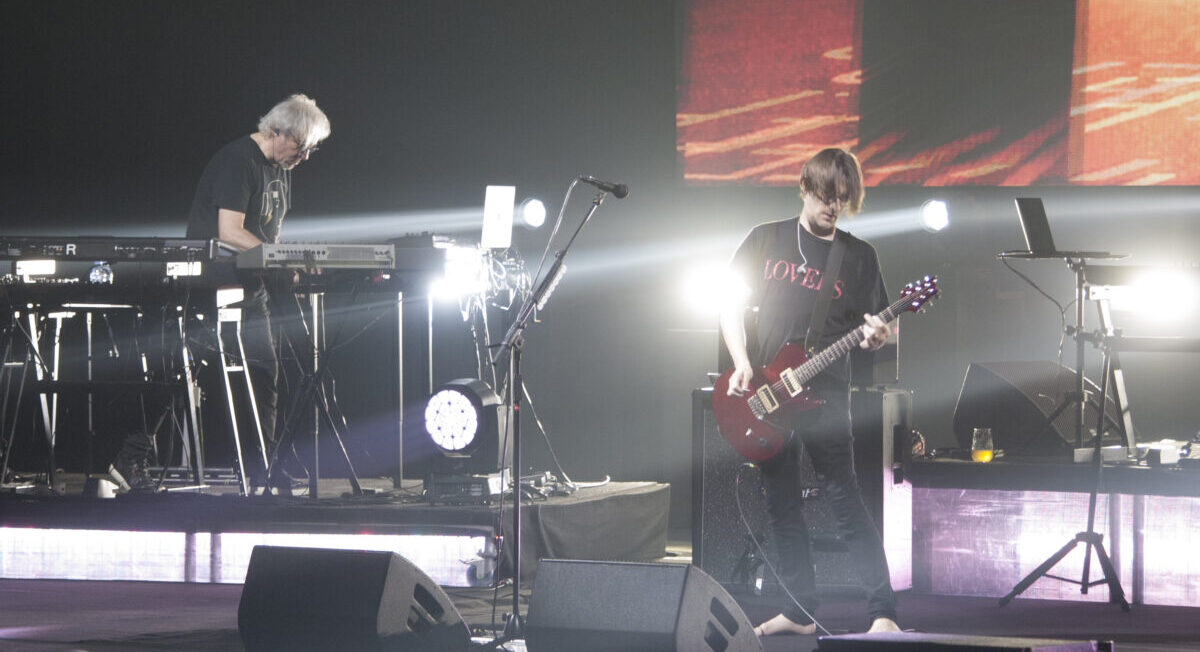Last Wednesday, the archangels of British progressive rock ascended into the azure sky. The band concluded their French tour with the Nice date, following a mandatory stop at Hellfest.
The members of the band Porcupine Tree clearly did not expect to find so many people attending their recital. Energized by the 2,000 to 3,000 fans present, the band felt uplifted to give their best performance.
Despite an unfortunate setback, it’s noteworthy to mention that the concert was marred by a minor incident, the absence of a bassist (a position then held by Colin Edwin). A nuisance, particularly for the dynamics of the songs, but when you have the “metronomic” Gavin Harrison on drums, it’s nothing more than a minor inconvenience.
Thus, the show began without a bassist, and the least that can be said is that the band decided to hit hard right away. Indeed, the excellent Blackest Eyes, the first track of the monumental In Absentia with its smashing rhythmic intro, immediately reassures us about the band’s desire to make a powerful statement; tonight, the Porcupine is out with its finest spines and certainly not to our displeasure. Then comes the track Harridan, perhaps the best track from their latest album, with its funky bass and pachydermic rhythmic passages, but bad luck, the bass was only present via pre-recorded track. Never mind, Sir Gavin is on guard and delivers a stratospheric groove that propels the track, proving once again that he is one of the greatest drummers of his era, if not in rock history more broadly—it’s no coincidence he’s part of the King Crimson team.
Following this is the very soothing Of the New Day, also from the latest album, a nuanced folk ballad composed with Mr. Wilson’s signature style—a melancholic and powerful chiaroscuro, a trademark of the English multi-instrumentalist. This is followed by Mellotron Scratch, from the album Deadwing. It’s a joy to hear this magnificent track, especially live; again, the emerging melancholy hits the mark, with arpeggiated passages and overlapping canon vocals giving the whole an aura of sweet melody tinged with dreamlike quality. It acts as a springboard for the exceptional Open Car, highly appreciated by connoisseurs.
Returning with the latest album, the track Dignity offers a small “Bowie-esque” interlude before returning to the album In Absentia and the very prophetic The Sound of Musak, which speaks of the overall cultural depletion, the rise of disembodied music without soul, intended solely for consumerism and the anesthesia of the masses, all in general indifference: “The music of the future will not entertain, it’s only meant to repress and neutralize your brain, soul gets squeezed out… And no-one cares enough.”
This is followed by a little time leap with the track Last Chance to Evacuate Planet Earth Before It Is Recycled, from the album Lightbulb Sun released in 2000. Here too, the societal theme is more prevalent than ever.
A Band with a Sense of Humor
This brings us to the incongruous moment of the intermission… After 25 minutes have elapsed, we find ourselves back in the lair of Nikaia, determined to properly celebrate this progressive rock festivity, alas, so rare on our azure lands. The band is already on stage, ready to unleash their masterpiece, the longest track they have ever crafted, the titanic Anesthetize, from the album Fear of a Blank Planet, spanning over 17 minutes of progressive onslaught.
But just before, Sir Wilson decided to share their recent performance at Hellfest, joking about the fact that he found the festival very metal and that they might have been a bit “light” for the event. Under the approving laughter and smiles of the audience, he added: “it was really great to play in front of so many people, a human tide stretching as far as the eye could see, thousands of people were there solely to wait to see Iron Maiden perform right after us.” The collective hilarity is immediate. It’s undeniable that there’s some truth in his words.
Anyway, it’s with this well-aimed bit of humor that the British combo decided to embark on what might well be their Sistine Chapel, a sound cathedral with the allure of a progressive epic in which everyone has a well-defined role. We find the immense Gavin Harrison in the role of chief architect, who, not content with erecting a rhythmic fortress, literally makes his drums sing note by note (a rare feat for a drummer). In the role of organist is the very shamanic Richard Barbieri, a true enchanter who gives this great progressive mass an almost hypnotic trance-like allure and, of course, in the role of the grand orchestrator, Mr. Steven Wilson, imperial, who seemsto have definitively locked his age at 20.
The final tracks roll by under our satisfied ears, and we reluctantly feel the time to part coming quickly. But just before and as a final encore, Sir Wilson allows himself one last aside, apologizing (again with irony, British humor obliges) for not having a real hit to offer us: “Sorry but we don’t have any Sweet Child O’ Mine or any Sweet Home Alabama, but, you know, it’s a good thing ’cause we can play what f* we want!!!” Literally, we’re sorry for not having a Sweet Child O’ Mine or a Sweet Home Alabama, but in the end, it’s a good thing because we can play whatever we want!!! They ended up relying on Spotify listens to identify one, the most listened, the folky: Trains, also present on the In Absentia album. Certainly, this live performance showcased this magnificent album to my greatest delight.
What better way to part than with a melancholic yet hopeful ballad, about trains departing for the unknown, a bit like two lovers saying goodbye on a platform, hearts heavy but rich with a love that can never be taken away from them.
Aurélien Maccarelli


